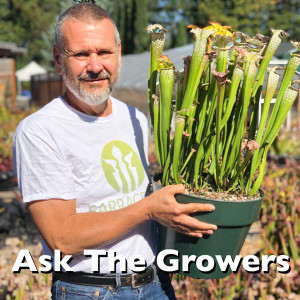May 15, 2023
Q/A #89 - Is It My Dad's Fault My Plants Died?
QUESTION:
My Venus flytraps and Sarracenia died over winter!! I put them in the garage for dormancy where it's around 40°F (4°C). I live in USDA Zone 5B. My father told me that I did not need to water them during dormancy. I used Sphagnum peat moss without fertilizer. So did my plants die because I did not water them during dormancy? They like dried out and stayed in color. But eventually the flytrap leaves turned BLACK. So was it my mistake and I'm responsible for $45 down the drain or is it my dad's fault for telling me to not water them during dormancy?
(Submitted in May 2019.)
RESPONSE BY JEFF DALLAS:
Uh oh! Might be your fault for listening to your dad. He meant well, but he gave you incorrect advice. You should always verify someone's advice if you know they are not an expert in the topic.
It sounds like they did indeed die of dehydration in winter. In their natural habitat, Venus flytraps and Sarracenia live in soil that's permanently wet, year-round, and they do indeed need water during dormancy. Bogs and swamps don't dry out in winter. Keep them in trays of water and don't let them dry out in winter!
Straight sphagnum peat (without fertilizer) is ok, not optimal, but ok. I do recommend adding perlite to the mix which provides better soil aeration and can help water wash out residual buildup from bacteria that peat would otherwise hold onto. Good aeration is required to maintain soil health. But you still need to water your plants!
I hope your dad is willing to replace your plants because of his poor advice. Make sure to watch our video on winter care. You should also get our digital download. There's a section that has details about winter care.
• The original question and response have been edited for publication.
• With a database of thousands of questions, we will post a Q&A every few days or so.
• To search for similar posts, click on a hashtag below or use the site's search function.
• To submit a carnivorous plant question, visit Ask the Growers.

